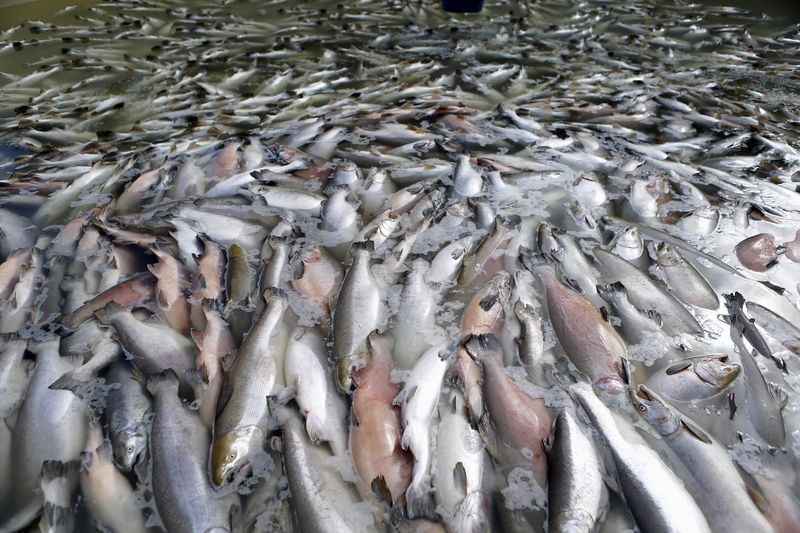By Anthony Esposito
SANTIAGO (Reuters) - Chile's salmon farmers are using record levels of antibiotics to treat a virulent and pervasive bacteria, driving away some U.S. retailers including Costco Wholesale Corp (NASDAQ:COST), which is turning to antibiotic-free Norwegian salmon.
The coastal waters of Chile, the world's second-largest producer of salmon, are awash with a bacteria known as SRS, or Piscirickettsiosis. The bacteria causes lesions and haemorrhaging in infected fish, and swells their kidneys and spleens, eventually killing them.
Unable to develop an effective vaccine, Chilean farmers have been forced to increase antibiotic use. In 2014, the industry produced around 895,000 tonnes of fish and used 563,200 kilograms (1.2 million pounds) of antibiotics, according to government and industry data. Antibiotic use had risen 25 percent from 2013.
In contrast, Norway, the world's largest salmon producer, produced around 1.3 million tonnes of fish and used 972 kilos of antibiotics in 2013. (Figures for last year were not immediately available)
Chilean officials say their salmon is safe and the antibiotics have been approved by U.S. food and drug regulators.
Still, amid growing concerns in the U.S. food industry that heavy use of antibiotics in animals can spawn drug-resistant superbugs and endanger human health, Costco told Reuters in April that it would reduce imports of Chilean salmon.
"The whole industry is starting to shift," said Jeff Lyons, who oversees fresh foods at Costco, the No. 3 U.S. retailer.
"If I was to ask you your biggest concern on produce, you might say pesticides. When we ask people in protein, generally it's going to be hormones or antibiotics."
Costco used to buy 90 percent of the 600,000 pounds of salmon fillet it needs per week from Chile, accounting for about 8.5 percent of Chilean salmon exports to the United States. Costco said it intends to buy 60 percent of its salmon from Norway, cutting Chilean imports to 40 percent.
A former executive at a Chilean salmon producer said Costco's move could hurt the local industry's reputation and spur other retailers to follow suit.
In recent years, U.S. grocery chains Whole Foods Market Inc (NASDAQ:WFM) and Trader Joe's have gradually phased out Chilean farm salmon in favour of antibiotic-free fish caught in the wild.
"This is the beginning of a change in seafood," said Tobias Aguirre, the executive director of FishWise, a seafood consultancy that works with retailers such as Safeway [MRWAY.UL] and Target Corp. (NYSE:TGT) Target has also eliminated farmed salmon from its shelves.
"Other retailers will look at their lead and try to better understand why Costco made this move, and I think they will follow," Aguirre said.
CHILE VS NORWAY
To be sure, not every salmon buyer is that worried about antibiotics. Chile exported $4.4 billion (£2.8 billion) worth of salmon in 2014, up 24 percent from the previous year, according to industry group SalmonChile.
For some buyers, costs are paramount. Brazil's biggest retailer, GPA SA, which buys some 3.6 million kilograms of Chilean salmon per year, said demand for antibiotic-free fish in the South American giant is small, and the high cost of importing from Norway is a deterrent.
"The greatest demand in the Brazilian market is for fresh salmon, purchased, for now, from Chile mainly due to logistics," GPA said in an email.
Chilean salmon producers said there is no reason for consumers to worry. Farmers do not administer antibiotics for months before harvesting the fish, so any traces of the drugs that remain in the salmon when it reaches consumers are within tolerance levels, they said.
"The final product consumers eat has no antibiotics," said Ricardo Garcia, chief executive of salmon producer Camanchaca, which reported nearly $500 million in sales last year.
"This is only something given to sick fish so they don't die. It's not something preventive," he said.
The U.S. Food and Drug Administration said in a statement that inspections of Chilean salmon have not found unapproved drug residues this fiscal year, which began on Oct. 1, and "any article of food that appears to be adulterated or misbranded at importation is refused admission" into the country.
GOVERNMENT RECOGNISES PROBLEM
In recent months, the U.S. food industry has taken an increasingly tough stance against antibiotics due to concerns that overuse may diminish their effectiveness in fighting disease in humans. Wal-Mart Stores Inc (NYSE:WMT), for instance, is pressing meat, seafood, dairy and egg suppliers to reduce their use of antibiotics.
Speaking in general terms, the FDA said it has "concerns about the improper use of medically important antibiotics in food products derived from animals, as this practise is one factor that can contribute to antimicrobial resistance in humans."
Antibiotic-resistant strains of the SRS bacteria have emerged in Chile's salmon farms, according to a November 2014 study on the government's National Fisheries website.
"The bacteria will respond for a few years to the antibiotics treatment but afterward will become stronger and resistant," said Alex Munoz, vice president for South America at the Oceana environmental group in Chile.
Salmon producers in Chile say they are aware they should reduce their dependence on antibiotics, but they do not expect a significant change since efforts to find an SRS vaccine have so far been unsuccessful.
In Norway, intensive research has produced vaccines against most bacterial infections found in salmon farms.
"We're faced with a reality in Chile, unlike Norway, where we haven't developed vaccines for the Chilean market, leading us to often correct things with the use of antibiotics," said Gerardo Balbontin, chief executive of Blumar, which exports a tenth of its salmon production to Costco.
The government acknowledges it has a problem on its hands.
"The use of antibiotics is an issue for us," said Eugenio Zamorano, head of Chile's aquaculture department. "All companies (in Chile) use antibiotics to a lesser or greater extent."

As well as working towards finding a vaccine, Zamorano said "genetic improvements" in salmon could be part of the solution.